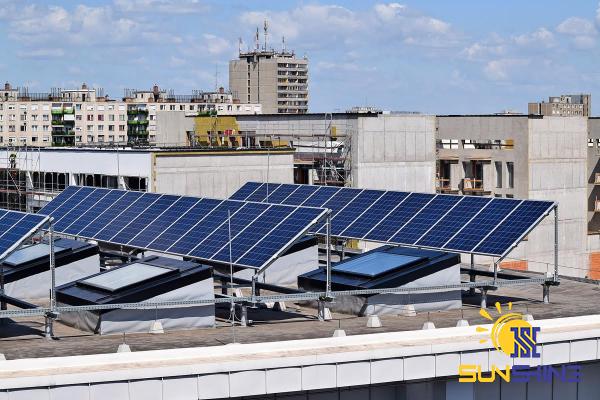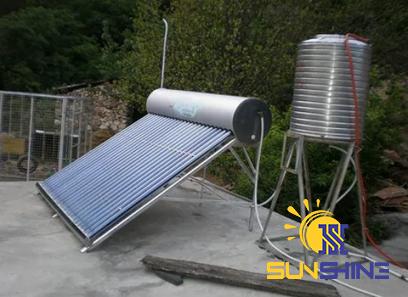India, home to diverse climatic conditions, is blessed with an abundance of sunshine for most parts of the year. Leveraging this natural resource, solar water heaters have emerged as a sustainable and cost-effective alternative to conventional energy sources to meet the hot water requirements of households, industries, and institutions across the country. In this article, we will delve into the various aspects of solar water heaters in India and explore their benefits, current market trends, and government initiatives supporting their adoption. 1. The Need for Solar Water Heaters in India: India is a country where the demand for hot water is substantial, be it for domestic purposes, commercial activities, or industrial processes. Traditional water heating methods such as electricity, gas, or oil contribute significantly to greenhouse gas emissions and consume limited natural resources. Solar water heaters offer an eco-friendly and renewable solution to this growing energy demand, reducing carbon footprints while ensuring long-term cost savings.
solar water
 2. How Solar Water Heaters Work: A solar water heating system consists of solar collectors mounted on rooftops or open areas, which trap sunlight and convert it into heat energy. This heat is then transferred to water stored in insulated tanks through a circulation pump or natural convection. The water gets heated gradually, and it can be used for multiple purposes such as bathing, cooking, or washing. 3. Benefits of Solar Water Heaters: Solar water heaters offer numerous advantages over conventional heating systems: – Reduced energy bills: Solar water heaters significantly reduce reliance on electricity, gas, or oil, resulting in substantial cost savings in the long run. – Environmentally friendly: Solar water heaters have minimal carbon footprints, as they generate clean energy using renewable resources, contributing to a greener and sustainable future. – Independence from the grid: Solar water heaters provide independence from power outages and fluctuations in electricity supply, minimizing disruptions to daily hot water needs. – Low maintenance: With few moving parts, solar water heaters require minimal maintenance and have a long lifespan, making them a reliable and hassle-free investment.
2. How Solar Water Heaters Work: A solar water heating system consists of solar collectors mounted on rooftops or open areas, which trap sunlight and convert it into heat energy. This heat is then transferred to water stored in insulated tanks through a circulation pump or natural convection. The water gets heated gradually, and it can be used for multiple purposes such as bathing, cooking, or washing. 3. Benefits of Solar Water Heaters: Solar water heaters offer numerous advantages over conventional heating systems: – Reduced energy bills: Solar water heaters significantly reduce reliance on electricity, gas, or oil, resulting in substantial cost savings in the long run. – Environmentally friendly: Solar water heaters have minimal carbon footprints, as they generate clean energy using renewable resources, contributing to a greener and sustainable future. – Independence from the grid: Solar water heaters provide independence from power outages and fluctuations in electricity supply, minimizing disruptions to daily hot water needs. – Low maintenance: With few moving parts, solar water heaters require minimal maintenance and have a long lifespan, making them a reliable and hassle-free investment.
Specifications of solar water
 4. Market Trends in India: The market for solar water heaters in India has witnessed steady growth over the years, driven by increasing awareness of renewable energy and government incentives. Key market trends include: – Growing consumer interest: More and more consumers are opting for solar water heaters due to the significant economic and environmental benefits they offer. – Evolving technology: Technological advancements in solar water heaters have resulted in increased efficiency, improved design, and better heat retention, making them more viable for a wider range of applications. – Geographical distribution: Solar water heaters are predominantly popular in regions with high solar radiation such as northern states, while efforts are being made to extend their adoption across the country. 5. Government Initiatives and Incentives: Recognizing the potential of solar water heaters for energy conservation, the Indian government has implemented various initiatives and incentives to promote their adoption.
4. Market Trends in India: The market for solar water heaters in India has witnessed steady growth over the years, driven by increasing awareness of renewable energy and government incentives. Key market trends include: – Growing consumer interest: More and more consumers are opting for solar water heaters due to the significant economic and environmental benefits they offer. – Evolving technology: Technological advancements in solar water heaters have resulted in increased efficiency, improved design, and better heat retention, making them more viable for a wider range of applications. – Geographical distribution: Solar water heaters are predominantly popular in regions with high solar radiation such as northern states, while efforts are being made to extend their adoption across the country. 5. Government Initiatives and Incentives: Recognizing the potential of solar water heaters for energy conservation, the Indian government has implemented various initiatives and incentives to promote their adoption.
buy solar water
 These include: – Financial subsidies and incentives for individuals and institutions investing in solar water heaters. – Net metering policies that allow consumers to sell excess solar energy back to the grid, further incentivizing solar adoption. – Tax benefits for solar water heater installation and usage, encouraging more individuals and businesses to choose renewable energy alternatives. Conclusion: As the world continues to grapple with the challenges of climate change, solar water heaters offer a sustainable and economically viable solution for India’s energy needs. With their numerous benefits and the support of government initiatives, solar water heaters are poised to play a pivotal role in reducing greenhouse gas emissions, conserving resources, and paving the way for a greener future in India.
These include: – Financial subsidies and incentives for individuals and institutions investing in solar water heaters. – Net metering policies that allow consumers to sell excess solar energy back to the grid, further incentivizing solar adoption. – Tax benefits for solar water heater installation and usage, encouraging more individuals and businesses to choose renewable energy alternatives. Conclusion: As the world continues to grapple with the challenges of climate change, solar water heaters offer a sustainable and economically viable solution for India’s energy needs. With their numerous benefits and the support of government initiatives, solar water heaters are poised to play a pivotal role in reducing greenhouse gas emissions, conserving resources, and paving the way for a greener future in India.










Your comment submitted.